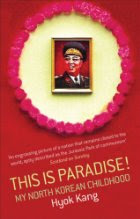
Because so little is written from eyewitnesses who have survived the famines of North Korea, this book has its place in informing and revealing the closely held secrets of the DPRK regime. Kang describes his youth and schooling, and the gradual descent of the country into hunger and deprivation, where the social structure, based on suspicion on idolatry, begin to show its weaknesses as neighbors and family members turn against each other to have another few cobs of maize. Children abandoned by their parents' death, or by parents who cannot feed them, live pitifully on the streets, begging, crawling the floor of the train station for any crumb that resembles something edible. Kang himself is a bit of a ruffian, and steals food, as do many many others. Kang's father, once photographed with the "Great Leader" Kim Il-sung, manages to avoid arrest though his temper and ambition often get in the way of a subservient life. Eventually he flees to China, works for several months and returns with bags of food only to be arrested and imprisoned for half a year. He avoids the certain death of the local prison in his village by having typhus, and is sent home to finish his sentence. He tells his son about cannibalism, and death upon death from hunger. During that period, though constantly watched (visited ten times a day or more by cadres and informants), he manages to escape once again to China, this time with his son (Kang) and wife. Grandmother is left behind. The decision to leave is agonizing for the mother, who is fearful of the unknown, and the journey the family takes, living in various parts of China, then through Vietnam and Cambodia, and finally to South Korea, is difficult. Their difficulties continue in South Korea, where prejudice against North Koreans is high, verbal, and indicative of the deep culture of mistrust between the two nations.

No comments:
Post a Comment